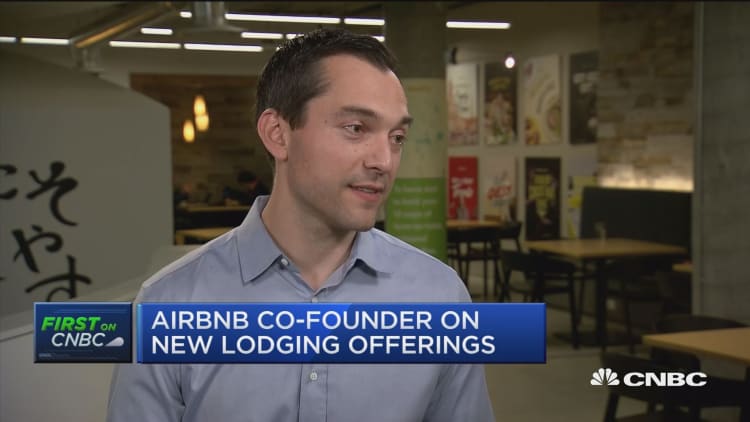A new report by the New York City Comptroller directly links the explosion of Airbnb rentals to rising rents in the Big Apple.
The report charges Airbnb with costing renters $616 million in additional rent in 2016 alone, and disproportionately burdening neighborhoods with higher concentrations of Airbnb rentals.
"For years, New Yorkers have felt the burden of rents that go nowhere but up, and Airbnb is one reason why," NYC Comptroller Scott Stringer said in a statement.
New York rents rose by about 25 percent between 2009 and 2016, the years that the study targeted.
Not all of that comes from Airbnb, but the report found that "as the share of units listed on Airbnb goes up by one percentage point, rental rates in the neighborhood go up by 1.58 percent." In other words, after controlling for external factors, the study found Airbnb contributed about 9.2 percent of overall rent increases.
According to the comptroller, that's because the rash of Airbnb listings prevents affordable units from being leased to renters.
"From Bushwick to Chinatown and in so many neighborhoods in-between, affordable apartments that should be available to rent never hit the market, because they are making a profit for Airbnb," Stringer said in a statement.
Despite city legislation that make Airbnb rentals illegal in many cases, listings soared from 1,000 in 2010 to more than 43,000 in 2015, according to AirDNA, a short-term rental analytics firm that provided data to the comptroller's office for this report.
Manhattan's Chelsea and Midtown Business District neighborhoods and Brooklyn's Greenpoint and Williamsburg were among the most affected. Airbnb rentals accounted for slightly more than 4 percent of total residential units in those areas.
Those same areas saw rents rise most rapidly. In Chelsea, rent rose 21.6 percent or $398 per month between 2009 and 2016. In Greenpoint and Williamsburg, rent rose by 18.6 percent or $659 per month.
New York City Airbnb rentals are no longer at highs, but in many cases those rentals are still illegal. After a 2014 report found that three-quarters of Airbnb listings in the city were in violation of regulations, Governor Andrew Cuomo in 2016 signed a bill allowing hosts to be fined up to $7,500 for violating regulations, The New York Times reported.
For its part, Airbnb has been proactive in removing what it calls "bad actors" — or those hosts who violate local laws or company policy. Since November 2016, it has removed close to 5,000 bad actors in New York City, alone, according to a spokesperson.
Following Cuomo's signing of the bill, Airbnb listings declined from their highs. But Comptroller Stinger's report demonstrates those listings are actively impacting rent increases — legal or not.
"Airbnb has grown exponentially at the expense of New Yorkers who face rising rents and the risk of being pushed out of communities they helped build. If we're going to preserve the character of our neighborhoods and expand our middle class, we have to put people before profits. It's that simple," Stringer said.
Airbnb took issue with the methodology behind the findings of Stringer's report. The online hospitality marketplace argued that most hosts share their homes, rather than removing permanent housing from the market, and that rising rental rates cannot be attributed to Airbnb when prices have been rising for decades.
"This mistakes correlation for causation, and it is deeply problematic," a company blog post said.
In the aftermath of the comptroller's study, Airbnb filed a Freedom of Information Law request with New York City's comptroller office. It hopes to acquire communications on the development of the report.
"Additionally, other information has been brought to our attention and we have reason to believe that this report was influenced by powerful special interests," said Chris Lehane, head of global policy for Airbnb.
Airbnb has sparred with regulators across the globe, but Chief Executive Brian Chesky in February seemed to be changing his approach to responsibility for how the company can impact housing markets and neighborhoods.
"When Airbnb started 10 years ago it was kind of the culture that you really can't take responsibility for what happens on your platform," he said. "We changed our point of view."
Chesky's February statements represent an evolution for the company, which previously defended itself as a passive technology platform, not responsible for what homes it listed or how they were used.
—Reuters contributed to this report.
WATCH: Airbnb co-founder: We're a responsible actor in homesharing regulations



